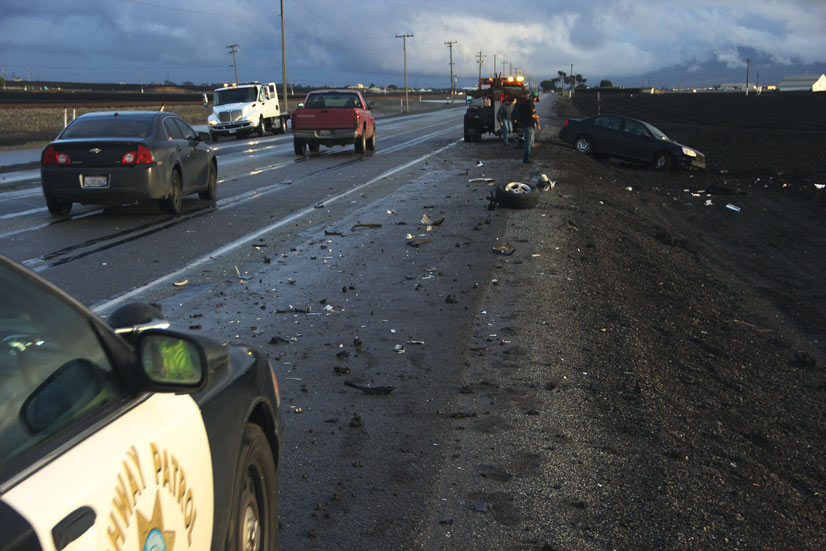How Does Indiana’s “No Pay, No Play” Law Affect the Uninsured?
Indiana is a fault state. We say this a lot here at Hensley Legal Group, but that’s because it’s so important. Because Indiana is a fault state, you can receive compensation from the at-fault driver’s insurance company after a car accident. It also affects how much you can recover from the other driver’s insurance company […]

November 15, 2017

Indiana is a fault state. We say this a lot here at Hensley Legal Group, but that’s because it’s so important. Because Indiana is a fault state, you can receive compensation from the at-fault driver’s insurance company after a car accident. It also affects how much you can recover from the other driver’s insurance company before having to go through your own.
One of the reasons this is important is because people who are uninsured can technically recover if they’re not at fault for the accident. Although we would never recommend banking on that, this part of Indiana’s fault laws helped families whose insurance lapsed for a few weeks or who didn’t know they had missed a payment.
But when the “No Pay, No Play” law went into effect on July 1, 2015, things got a bit more complicated.
How Fault Works in Indiana

Car accidents are expensive. If your car is damaged, you’ll either need to replace or repair it. You may also need a rental car in the meantime to make sure you don’t miss work. If you’re injured, you’ll likely face a mountain of medical bills. Depending on the severity of your injuries, you may have to take time off of work, or you may never be able to return to your former job. You may have to go through therapy or purchase medical equipment to accommodate your condition. At the end of your treatment, you may only recover a percentage of the abilities you once had.
That’s one reason why car insurance is so important to have. In Indiana, you must demonstrate “financial responsibility” in order to legally operate a vehicle. For most Hoosiers, that means purchasing car insurance.
Then, there’s fault to consider. The state of Indiana doesn’t think it’s fair to make a person seek compensation through their own insurance company if they didn’t contribute to causing the accident. Instead, it allows a person who is less than 51 percent at fault to seek compensation through the other driver’s insurance company. However, the minor percentage of fault attributed to that person may diminish what they’re allowed to recover.
For example, if a person is 20 percent at fault and has $100,000 in damages, they would be able to recover through the at-fault driver’s insurance company. However, 20 percent would be deducted from the amount they could recover, so they would only recover $80,000 in this case. For the remaining $20,000 in damages, they would have to turn to their own insurance company for coverage.
This system allows people who are uninsured to still recover if they’re not at fault for the accident. Even if fault is split, as long as they are below 51 percent at fault, they can still recover a portion of their damages from the at-fault driver’s insurance company.
The Effects of “No Pay, No Play”

In July 2015, Indiana’s “No Pay, No Play” law went into effect. It states that uninsured people injured in auto accidents cannot recover noneconomic damages if they were previously cited for not having insurance.
What does this mean? Essentially, this law keeps uninsured people who have a history of driving without insurance from recovering certain damages from another driver’s insurance company after an accident.
Damages can be separated into two categories: noneconomic and economic. Economic damages are expenses with an easily calculable price tag. Think of hospital bills, lost wages, or the cost of therapy. If it’s something you would typically receive a bill or receipt for, it’s like part of your economic damages.
Noneconomic damages, however, are things for which you receive compensation that are less easy to calculate. According to Indiana Code, noneconomic damages include:
- Physical and emotional pain and suffering
- Physical impairment
- Emotional distress
- Mental anguish
- Loss of enjoyment
- Loss of companionship, services, and consortium
- Any other nonpecuniary loss proximately caused by a motor vehicle accident
This is crucial to understand. The “No Pay, No Play” law doesn’t prohibit uninsured drivers with a history of driving without insurance from recovering economic damages. That means you can still choose to go through the at-fault driver’s insurance company to recover your medical bills, among other expenses. You may not get compensation for your mental anguish, for example, but you can get compensation for the cost of counseling.
Rules and Exceptions

The law makes it clear where the “No Pay, No Play” law applies and where there are certain exceptions:
- Fault: Even if the uninsured person is not at fault, they will not be allowed to recover noneconomic damages from the at-fault driver’s insurance company if they have a history of driving while uninsured.
- Passengers: Nowhere in the law does it say the uninsured motorist has to be operating the vehicle at the time of the accident to be prohibited from seeking noneconomic damages. Even if you are merely a passenger in the crash, if you’ve been previously cited for not having insurance and you’re still uninsured, you will not be able to recover noneconomic damages.
- Under 18: If you are under the age of 18, the “No Pay, No Play” law does not apply to you.
- Criminal Conviction: If the other driver involved in the accident is convicted of a crime in connection with the accident—if, for example, they’re convicted of drunk driving—then the “No Pay, No Play” law does not apply to you.
Help from an Indiana Car Accident Lawyer
The “No Pay, No Play” law complicates Indiana’s rules on fault, making it even more difficult for people to determine whether or not they’re eligible for compensation after an Indiana car accident.
That’s where we come in. At Hensley Legal Group, our car accident attorneys can go over your situation and help you determine what your next steps are. Call us today or contact us online for a free case review.